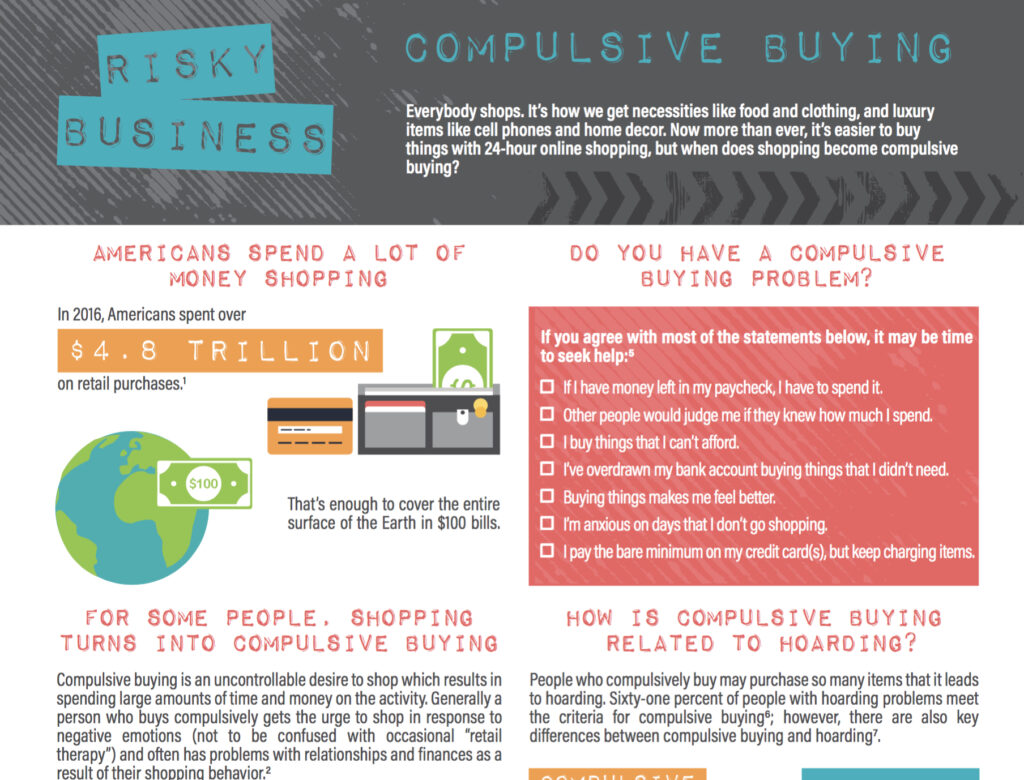Every May since 1949, the US has observed Mental Health Awareness month. You will probably read and hear public service announcements about it, and your local community may sponsor events such as screenings, 10k runs and walks. This is an ideal time for you to blog about mental health, and to speak about it in community presentations and media interviews.
Sources of free materials and ideas that you can draw on:
Mental Health America offers a complete toolkit, with fact sheets, worksheets, copy-and-paste social media posts, press releases, talking points and more. Among the many colorful, informative handouts are "The Gut-Brain Connection" and "When Changing Sleep is Hard." You can also download previous years' toolkits with educational materials on other topics. For example, here's an excerpt from last year's fact sheet on compulsive buying:

The National Alliance on Mental Illness (NAMI) is observing Mental Mental Health month with the theme, "Stamp Out Stigma." On their website you can download infographics that illustrate the prevalence and consequences of mental illness in the general population, among teens and across diverse groups. NAMI's interactive website also invites people to share their stories and to participate in discussions.
The Military Health System provides articles and resources of interest to military families. As you know, depression, PTSD and other conditions can linger long after military service has ended.
What you can do to increase awareness of mental illness and mental health
The national public education campaigns can help increase general awareness about mental illness and mental health, but your local outreach can go further, addressing specific problems as they pertain to various groups people in your community.
Local public education on mental health issues is beneficial to the community and to you. Your basic information and practical tips can motivate many people to improve their lives through small adjustments. You can also provide information on how and where to get treatment, for those people who realize they need professional help. And in the process of educating the public about mental health, you will increase your visibility in the community - which could lead to more referrals and other opportunities.
Here are a few ways to get involved in Mental Health Awareness Month:
1. Participate in mental health awareness events in your local community. To find events, check with your state professional association, or search online for "mental health awareness" 2018, and add your city or state to the search box.
e.g., "mental health awareness" 2018 Minneapolis
By becoming involved in your community events, you will not only help inform the public about mental health; you will also get to network with event organizers. This may lead to other community leadership projects or business opportunities.
2. Give presentations to community groups on topics that they can relate to. Most communities have support groups, special interest groups and meetup groups that welcome speakers at their meetings. Civic clubs, such as Rotary and Kiwanis, meet weekly and are always looking for interesting speakers who can give an interesting 20-minute talk. You need not be a member. Simply contact the organization's Program committee chair to pitch your idea. If you want to set up your own presentation, your local library or YMCA may be willing to provide you with a free room for your talk.
3. Get interviewed by news media. During Mental Health Awareness month, your local and regional TV, radio, and print journalists often seek experts to provide timely information and tips about mental health topics. If you contact the media outlets' news director or health editor with a news story idea, you have a better chance of getting interviewed than your colleagues who wait for the media to approach them.
4. Make fact sheets, tips sheets and other handouts. Pass them out at your talks. Give them to journalists who interview you. Print extra copies for your waiting room. For content, you can use some of the resource links above. Also see my recent post, Free Content From US Government for Your Public Education Materials. Wherever possible, include your name and contact information, either by typing it onto the sheet or by adding a sticker.
5. Write blog posts and op eds about mental health. Tailor your message to your target audience. For example, if you work with kids and families, your writing would address mental health issues specific to that population, rather than simply global statistics and general advice.
6. Curate news and research information about mental health, and post it on social media - Twitter, Facebook, Pinterest, etc. Not only will you help filter reliable information to the public; you will also be building your platform as a trusted expert.






